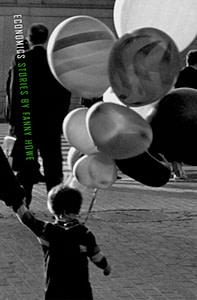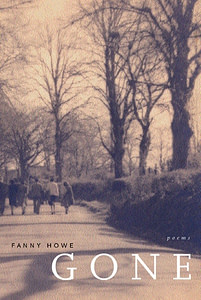Jordan Davis Reviews Fanny Howe's Gone and Economics
Fanny Howe
University of California Press, 2003 / Flood Editions, 2002
Reviewed by: Jordan Davis
July 13, 2003
// The Constant Critic Archive //
Poetry, for all its revelry in connotations, ambiguity, slippage, and nonsense, is nevertheless a magnet for certainty-seekers. Or doubters. Same thing. I have a “Fanny Howe’s great but nobody has explained why” speech: it starts out noting the distinction between poetry and prose having become less of a border than a demilitarized zone; there’s a digression about poetry critics still talking about bloodlines while the world’s moved on to the human genome project; I end noting that close reading is a great way to sell encyclopedias. You seem to be a clever and impatient crowd, so I’ll skip the speech and get straight to the point.
There are two books published this year under Howe’s name. It’s as if they were written by two different people: The worldly Fanny Howe writes consumable, laconic prose narratives with recognizable characters in Economics; in the poems in Gone, the otherworldly Fanny Howe puns through psychological dilemmas and puzzles of Christian theology with a polished vocabulary and ambiguously connected lines.


In the books of hers I like most, she observes and goes right past distinctions between genres, races, worlds: The Lives of a Spirit, One Crossed Out, Holy Smoke, and most of Nod and The Deep North. These books tell consuming stories; their conflicted characters make risky choices based on imperfect knowledge. Their world is brighter and darker than this one. Black and white thinking never gets anyone anywhere there.
The best work in each of her new books is literally astonishing—action, thought, and emotion come out of nowhere and vanish just as quickly. As much as any writer of recent years, Howe enacts what the South American poet Jorge Guinheime called hasosismo, or the art of the fallen limb, in which startling insights emerge and are subsequently concealed.
In the story “Scourge,” Joe mugs Elaine, then when she turns out to be a friend of a friend’s sister, he pays her back, and eventually moves in with her. All these shifts of power and empathy occur with a speed and inevitability that confuse violence and love.
The girl was standing beside her car, and it came over him—as it never had before, but in a rush, like the fluid force of love—that he would go and take her purse away and have some money. He leaned against her—it was dark—and dislodged the shoulder bag easily. She didn’t protest, but gave a look of blue-eyed anguish. (Economics, 65)
That’s the second paragraph; a few pages/weeks later, when they meet again and their mutual friend insists he walk her back to her car, Joe continues his experiment in will and consequences:
She was fumbling with the key—he didn’t move, absorbing the bizarre nature of the situation, like a pleasure. He was now the danger and the protector; it had the irony of Greek drama—Sophocles’ Oedipus he had always liked. Being two opposites combined, Fate. A new power. (68)
Howe’s prose rhythm usually gives the impression of both spontaneity and intention—here, the interjections hit the sweet spot of the excitement. But it’s her psychological acuity that pays the bills, or will. Joe smiles condescendingly when Elaine says she has “a lot of black friends”; however, when he finally realizes that not only will no one punish him for being involved with a white woman, but that even his sister sees it as a way out of the projects (and off her back), he feels a chill. It’s an unexpected confirmation of certain “eloquent, if bitter, ideas regarding race and poverty” he’d expressed to Elaine, knowing “no black woman would let him go on this way.”
‘The whole point of society,’ he would say, ‘is to remove natural inequalities. No one is created equal. That’s what we’ve got to do when we make a society—create a false situation. One that is equal. I mean, even Mother Nature is a bitch.’ (71)
The comfort Joe takes in maintaining distance from Elaine transmutes into a reliance on her affection and support, and an urge to protect her. In an ending out of Chekhov, Joyce, or Paley, Howe is careful to indicate that though Joe’s future appears hopeful, it is uncertain, and likely to be marked by an intimacy-damaging need for independence. “He felt heavy with stories he had read about moves like this—slave stories about escape—and he guessed he would survive this way, by reference and by thought.”
Thought, as Howe demonstrates in the prose piece, “Doubt,” is not automatically a tool for progress. Explicating Simone Weil’s “little prose poem called Prologue” in five searing pages, she analyses the intertwined experiences of doubt and depression. Her premise one-ups William Carlos Williams—where he laments that “people die every day for lack of what is found” in poetry, she warns that even those who think to look there are not necessarily exempt from that fate: “multitudes succumb to the sorrow induced by an inexact vocabulary.”
While we would all like to know if the individual person is a phenomenon either culturally or spiritually conceived and why everyone doesn’t kill everyone else, including themselves, since they can—poets act out the problem with their words.
Why not say “heart-sick” instead of “despairing”?
Why not say “despairing” instead of “depressed”? (Gone, 23)
As with “Scourge,” there’s a switcheroo that comes as a surprise despite its set-up: having narrated the pivotal moment of the Weil poem, she prepares the reader for an analysis, which she then disposes with by essentially repeating the pivotal moment. She enacts the experience of entering a feedback loop; the painful moment and the reactions to it are relived from slightly different angles, reinforcing the pain.
She is happy. Then suddenly, without any cause, he tells her it’s over. She is out on the streets without direction, without memory. Indeed she is unable to remember even what he told her without his presence there to repeat it, this amnesia being the ultimate dereliction.
If memory fails, then the mind is air in a skull.
This loss of memory forces her to abandon hope for either rescue or certainty.
And now is the moment where doubt—as an active function—emerges and magnifies the world. It eliminates memory. And it turns eyesight so far outwards, the vision expands. A person feels as if she is the figure inside a mirror, looking outwards for her moves. She is a forgery. (25)
Four times in four paragraphs, Howe says that the protagonist of the poem within the poem has lost her memory. This maddening repetition appears to be both spontaneous and intentional, an echo both of the gorgeously arrogant Dostoevsky quote (“Even in Europe there have never been atheistic expressions of such power. My hosannah has gone through a great furnace of doubt.”) and her double summary of Weil’s project (the “conviction that evil proves the existence of God” and her “superhuman effort at conversion to a belief in affliction as a sign of God’s presence”). What is often called depression Howe comes close to naming a leap of faith’s opposite number, and the probability grows that what has been called doubt is in fact negative certainty. Having followed Weil’s lead in laying waste to the possibility of establishing a stable self through outside support, Howe then dismisses the possibility of saving oneself through therapy, or conversion, or art—and before you can shout SSRI at me, let me thank you for your patience, and take a paragraph more of your time.
Of the other stories in Economics, “Fidelity,” “Radical Love,” and “Lotto” demonstrate Howe’s enormous capacity for reconciling psychological insight with empathy for her characters. “The Cold War” and “Elevator Story” are pleasant enough, but thin; “The Weather,” “The Blue Pool,” and “Gray” are righteous bordering on miserable. Howe’s Selected Poems mysteriously did not include poems from her outstanding One Crossed Out; she merged two poems from Robeson Street and edited them by deleting thorny but living phrases; and her selections, while excellent, gave me to worry that her interest in evocative ambiguity might at some point take over her capacity for telling discomfiting truths. Both interests are present, and mainly segregated, in Gone.
COMMENTS:
Pablo Peschiera July 27, 2003 at 1:38 am
I have found a new adjective to describe your review. It is “scrumptilious.”
But forgive me, I josh. In truth, it is funny and smart—your review’s traits include all the qualities that I read reviews for. Only because you do not explain why, it is a pity that the last paragraph is mostly summary.
In any case, I consistently enjoy your reviews.
Big thanks,
Pablo